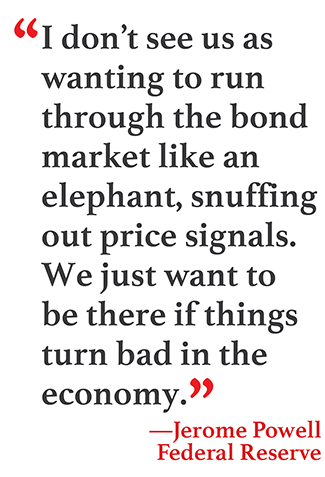Federal Reserve Chairman Jerome Powell played down the significance of the central bank's decision to begin buying individual corporate bonds in the secondary market, one day after news of the move helped ignite a rally in bond and stock prices.
Appearing before the Senate Banking Committee to deliver the Fed's semi-annual report to Congress, Powell said it will not be boosting purchases through its Secondary Market Corporate Credit Facility (SMCCF)—an emergency lending program that, to date, has bought only exchange-traded funds (ETFs). "We're not actually increasing the dollar volume of things we're buying," he said. "We're just shifting away from ETFs to this other form of index."
In its announcement on Monday, the Fed said it will follow a diversified market index of U.S. corporate bonds created expressly for the facility in deciding which individual issues to purchase.
 Powell defended the Fed's foray into corporate bonds against accusations it is needlessly intervening in a market that already has dramatically improved from its depths in March.
Powell defended the Fed's foray into corporate bonds against accusations it is needlessly intervening in a market that already has dramatically improved from its depths in March.
"I don't see us as wanting to run through the bond market like an elephant, doing things and snuffing out price signals," he said. "We just want to be there if things turn bad in the economy."
The Fed said the index it will use for its purchases "is made up of all the bonds in the secondary market that have been issued by U.S. companies that satisfy the facility's minimum rating, maximum maturity, and other criteria.
"This indexing approach will complement the facility's current purchases of exchange-traded funds," the central bank added.
The Fed's Goal
Powell's comments suggest the Fed will use a mix of ETF and individual bond purchases based on the index to achieve its goal of improving the functioning of the market. How much it buys overall will depend on how successful it is in achieving that end, the chairman said.
"If market functioning continues to improve, then we're happy to slow or even stop the purchases," he said. "If it goes the other way, we'll increase."
The SMCCF is among a number of emergency lending programs the Fed has announced since mid-March aimed at limiting damage to the U.S. economy from the coronavirus pandemic. With a capacity of $250 billion, it has so far invested about $5.5 billion in ETFs that purchase corporate bonds.
Former New York Fed official Krishna Guha said Powell's comment that the volume of dollar purchases won't be increased could come as a "negative surprise" to financial markets after they were buoyed on Monday by the Fed's announcement that it will begin buying individual corporate bonds.
See also:
- Brawls Erupt in U.S. Debt Markets
- A Tsunami of Loan Modifications Is on the Horizon
- Search for Solutions as the Tsunami Approaches
- How to Ride High on the Loan-Modification Wave
- 7 Workstreams for Loan Modifications
"We had assumed that the initial single-name purchases would be modest but additional to the existing pace of bond ETF purchases," Guha, who is head of central-bank strategy at Evercore ISI, said in a note to clients.
In a back-and-forth with the Fed chairman at the hearing, Senator Pat Toomey echoed some investors in questioning why the central bank is supporting a market that has improved significantly in recent months. "It's not clear to me why the Fed needs to be intervening actively in the corporate bond market right now," the Pennsylvania Republican said.
Powell agreed it is functionally substantially better and a lot of the improvement came with just announcing the formation of the credit facility. But he said the Fed believes it should deliver on its pledge to aid in that improvement.
"I wouldn't say it's the main reason," he said. "One reason is, though, we feel we need to follow through and do what we said we were going to do.
"It was out of an excess of caution to preserve these gains for market function" that the Fed acted, he added.
© 2025 ALM Global, LLC, All Rights Reserved. Request academic re-use from www.copyright.com. All other uses, submit a request to [email protected]. For more information visit Asset & Logo Licensing.




